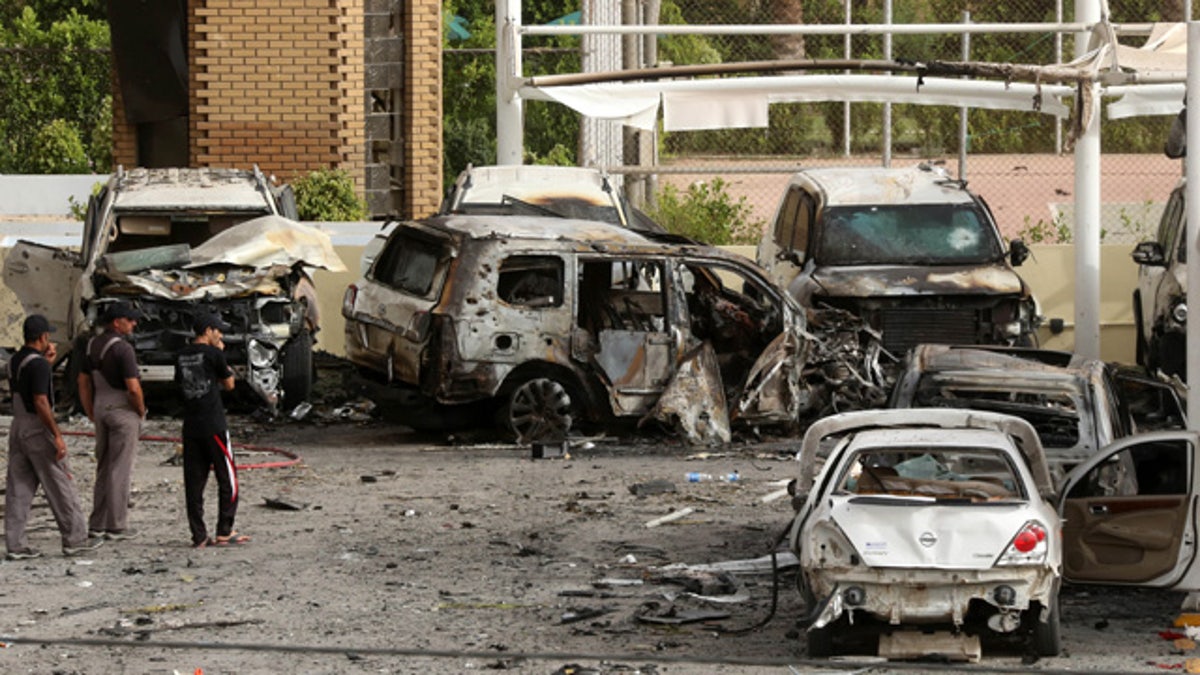
May 29, 2015: Civilians and security forces inspect the aftermath of a car bomb attack in the parking lot of Babil hotel in Karrada neighborhood, Baghdad, Iraq. (AP Photo/Hadi Mizban)
BAGHDAD – The death toll from bombings that targeted two prominent hotels in Baghdad a day earlier rose to 15 people, with another 42 wounded, Iraqi authorities said on Friday, as a lawmaker warned that the capital is vulnerable to more attacks.
The double bombing occurred late Thursday when two separate car bombs went off in the parking lots of the Cristal, formerly Sheraton, and Babil hotels. Initial reports said 10 people were killed and 27 wounded, but the casualty figures rose overnight.
The two explosions shattered windows of the recently renovated hotels and destroyed several cars. Baghdad's top hotels are usually crowded on Thursday nights with people attending wedding celebrations or parties.
The twin attacks targeting heavily secured buildings in the heart of Baghdad demonstrate the boldness and freedom with which militants have been able to operate inside the capital. The two car bombs were detonated by remote control, police said.
Police said a third car bomb found near the Babil Hotel was discovered and defused early Friday. A police officer blamed the infiltration on the negligence of the hotel guards and the weak security measures adopted by police in Baghdad.
All officials spoke on condition of anonymity because they are not authorized to speak to the media.
Sameer al-Shwaili, a spokesman for government's Anti-Terrorism Apparatus, said that more attacks on Baghdad are expected as military operations continue in an effort to drive out Islamic State militants from the Sunni-majority provinces of Anbar and Salahuddin.
"The situation is directly related to operations in Anbar, and operations in Tikrit. Iraq is in a state of war and what happened in Baghdad is a product of that war," al-Shwaili told The Associated Press in a telephone interview.
Nobody has claimed responsibility for the attacks, but al-Shwaili placed the blame on the Islamic State group.
"Car bombs and bombs are typically used by Daesh in a way to create fear among the citizens of Iraq," he said, using the Arabic acronym for the IS group.
Muwaffak al-Rubaie, Iraq's former national security adviser said that the IS group, which mainly attacks members of security forces, and Shiite mosques, seems to be changing tactics and selecting new targets frequented by the middle and upper class.
"I think IS is developing new techniques for getting through the mirrors, the physical searches, and even the canine searches," said al-Rubaie who is currently a member of the Iraqi parliament.
Baghdad-based security expert Muataz Muhei said that Baghdad police officers and hotel security guards often lack the expertise and needed to deal with the kind of security challenges presented by the Islamic State group.
"Daesh chose those well-protected sites in order to display to the public that they are still able to hit hard targets," said Muhei.
Iraq witnesses almost daily attacks that have been frequently claimed by the Islamic State group -- which seized large swaths of the country during a blitz last year and recently overran the city of Ramadi, provincial capital of Anbar province.
Fighting also continues in several parts of Salahuddin province, where government forces -- backed by Shiite militias and airstrikes from the U.S.-led coalition -- took back the city of Tikrit from IS militants earlier this year.
In Friday's violence, police and hospital officials said a roadside bomb hit a commuter bus in eastern Baghdad, killing three passengers and wounding 10 others.







































